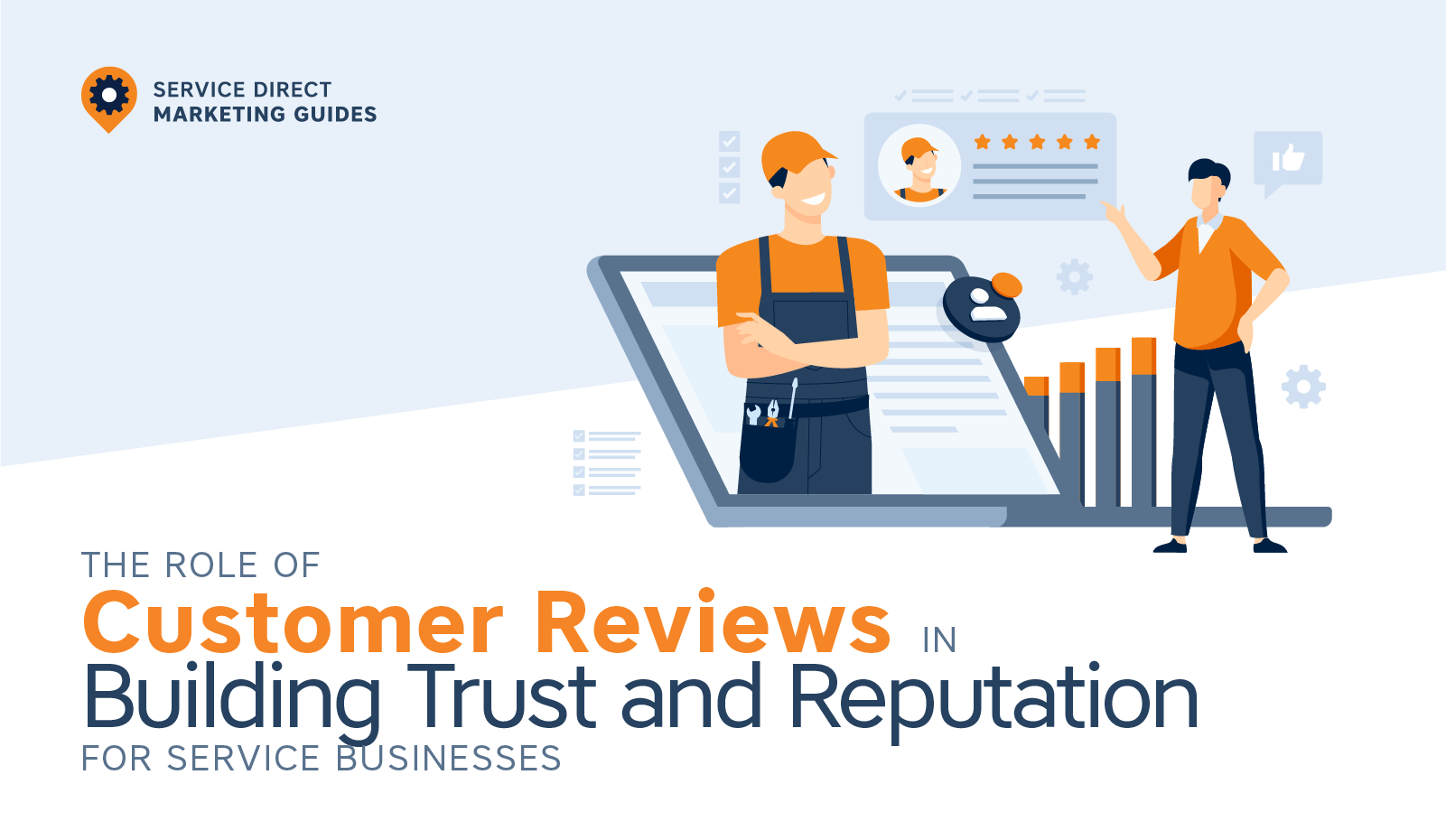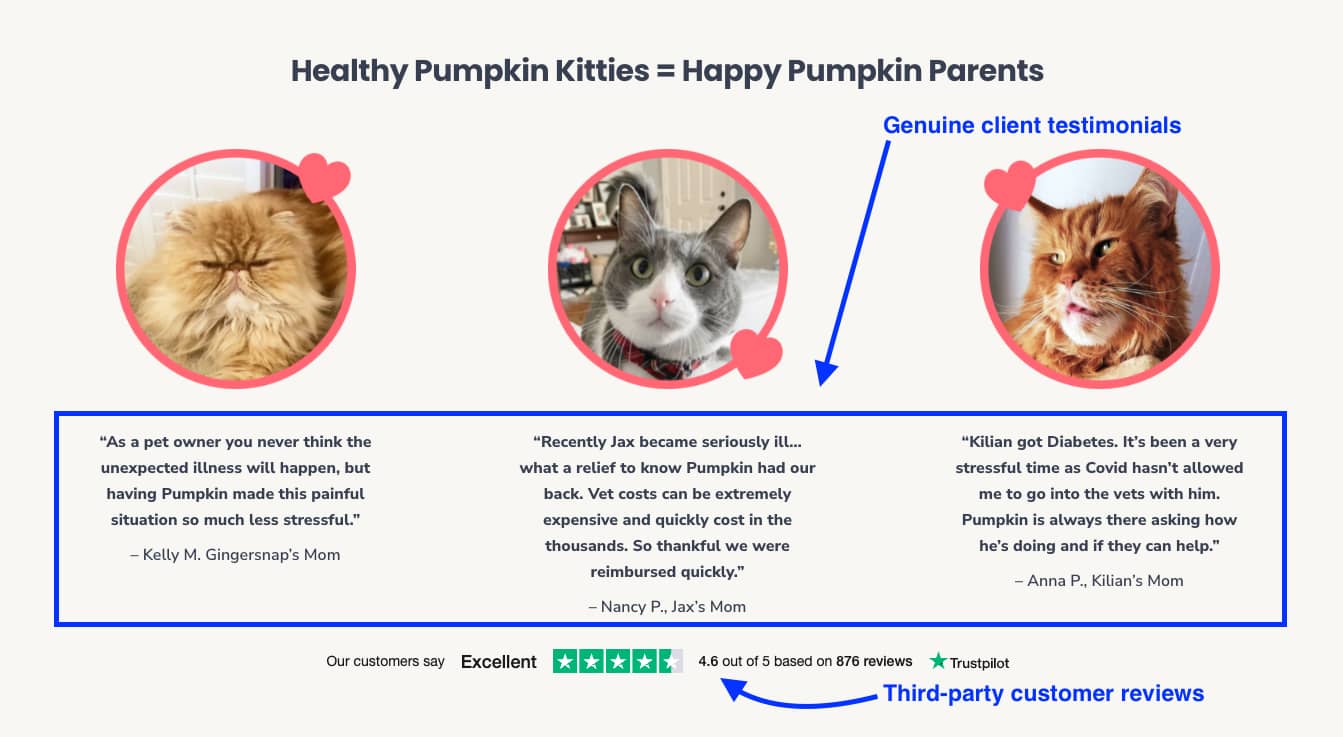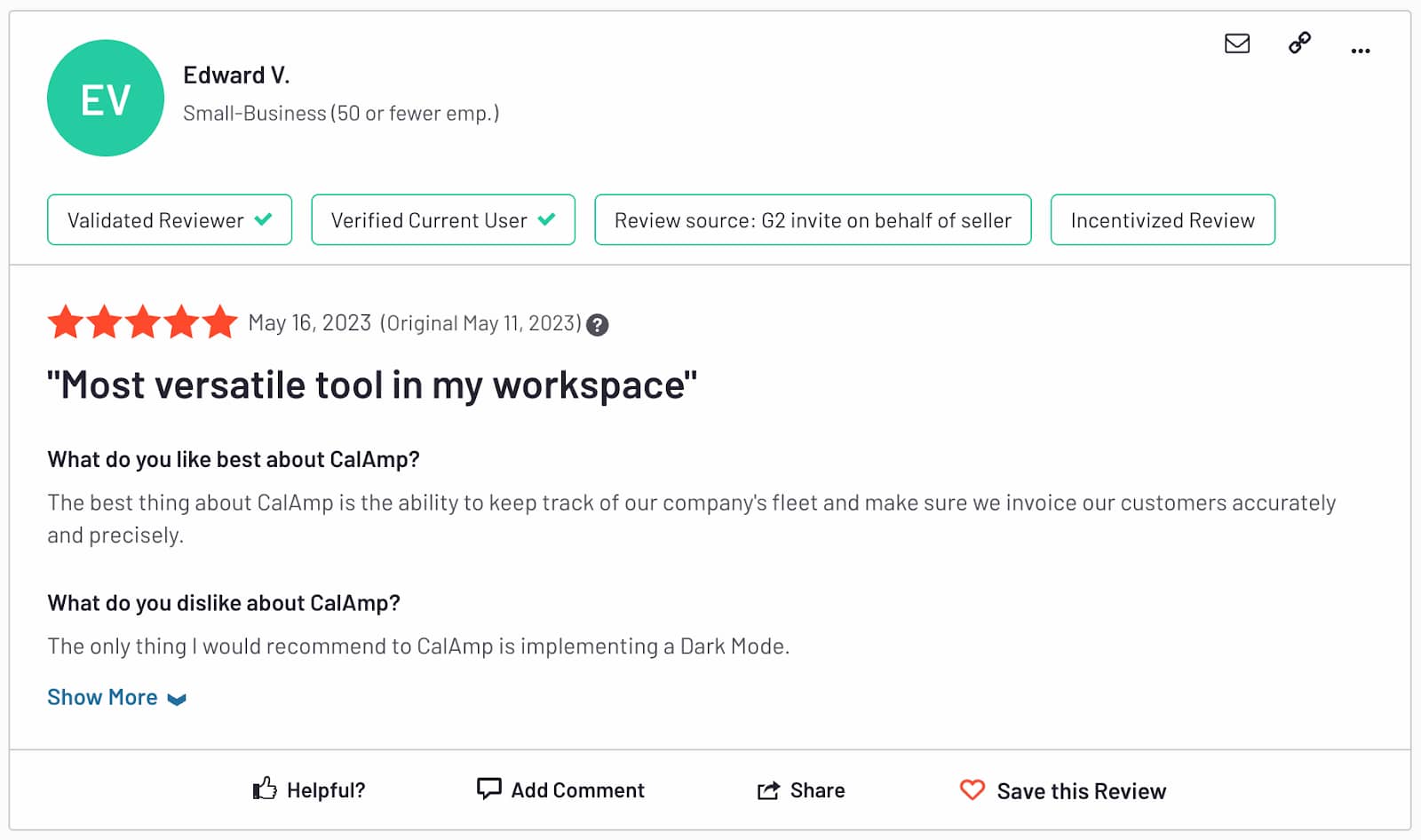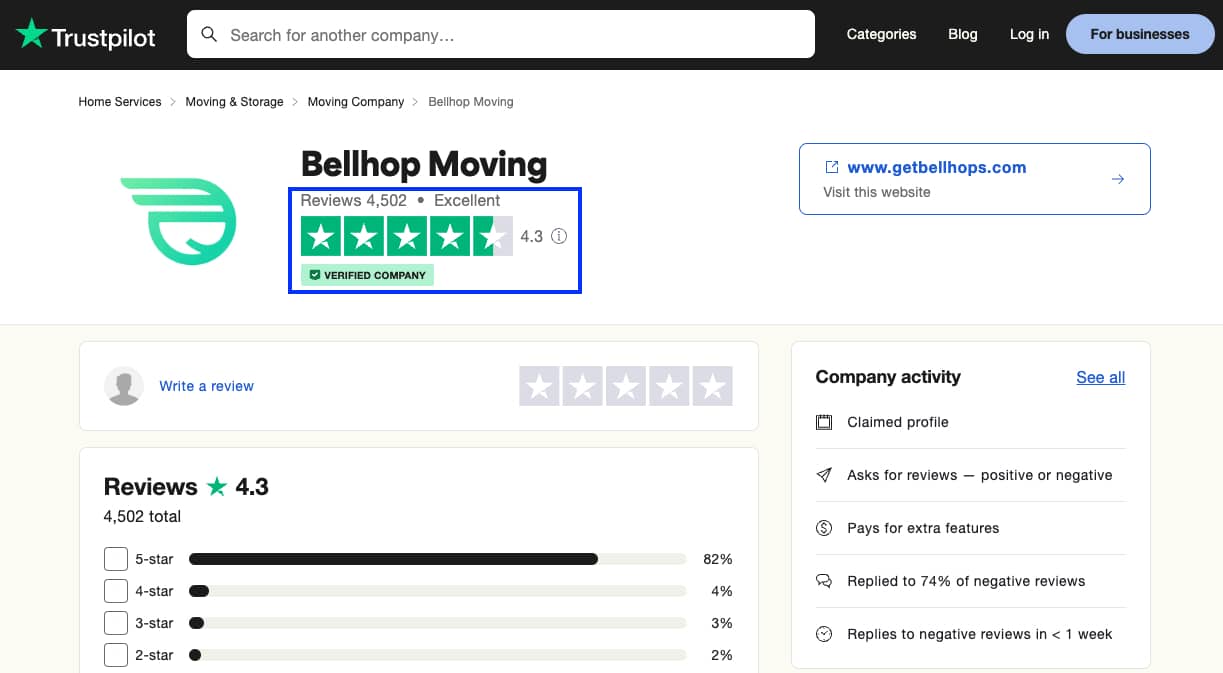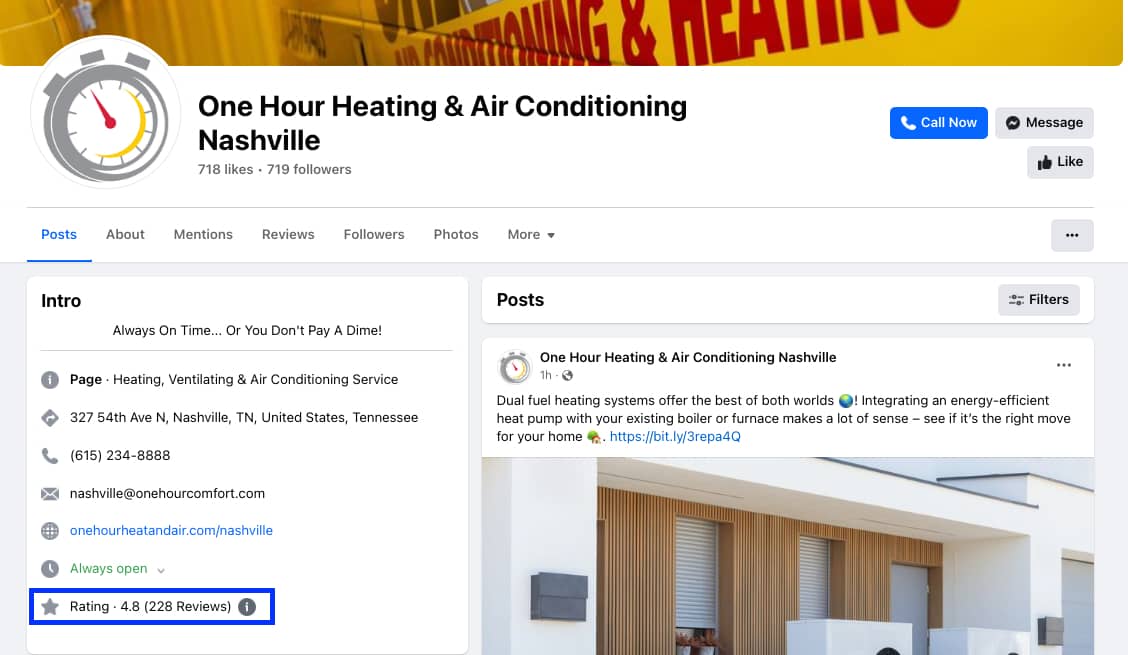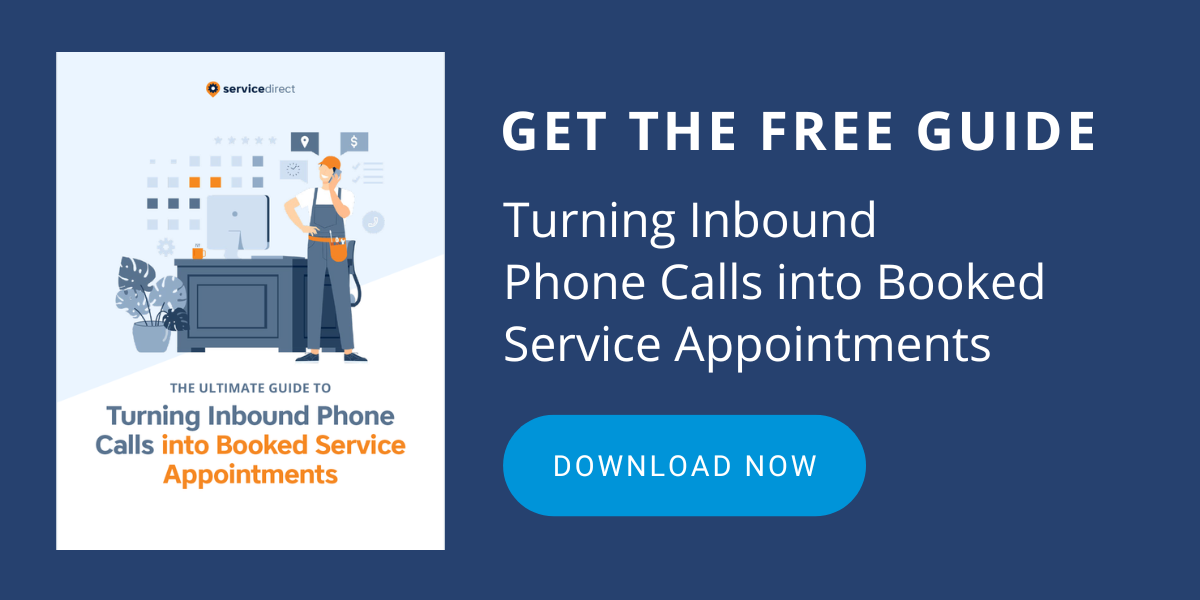The Role of Customer Reviews in Building Trust and Reputation for Service Businesses
When a person chooses to work with your business, they’re not only investing their hard-earned money, they’re also placing their trust in you. While refunds may be simple enough to process when things go wrong, trust, once lost, isn’t so easy to get back.
That’s why building and maintaining a strong, solid reputation is essential for any service business. Collecting reviews from satisfied customers is one of the best ways to build trust and your reputation.
Customer reviews can make or break your business. In this guide, we’ll explain the role of customer reviews in building your reputation and how to leverage them to your advantage.
Let’s dive in.
Trust and Reputation: Cornerstones of Service Businesses
Service businesses appeal to the average consumer—many work in local markets, servicing people with limited budgets, time, and resources.
Therefore, a consumer gives a lot of thought to choosing the right business for their particular problem. In fact, over 99% of people read online reviews. The more expensive a service is, the more a person will heavily consider the options in front of them.
For example, if a homeowner needs to hire an HVAC company to install a $10,000 central air system with ductwork, they’re more likely to read a number of online reviews for local HVAC companies.
By doing so, they can make sure they’ll feel confident in their decisions to hire the most qualified company for the job. Why? Because hundreds or thousands of previous customers can vouch for the company.
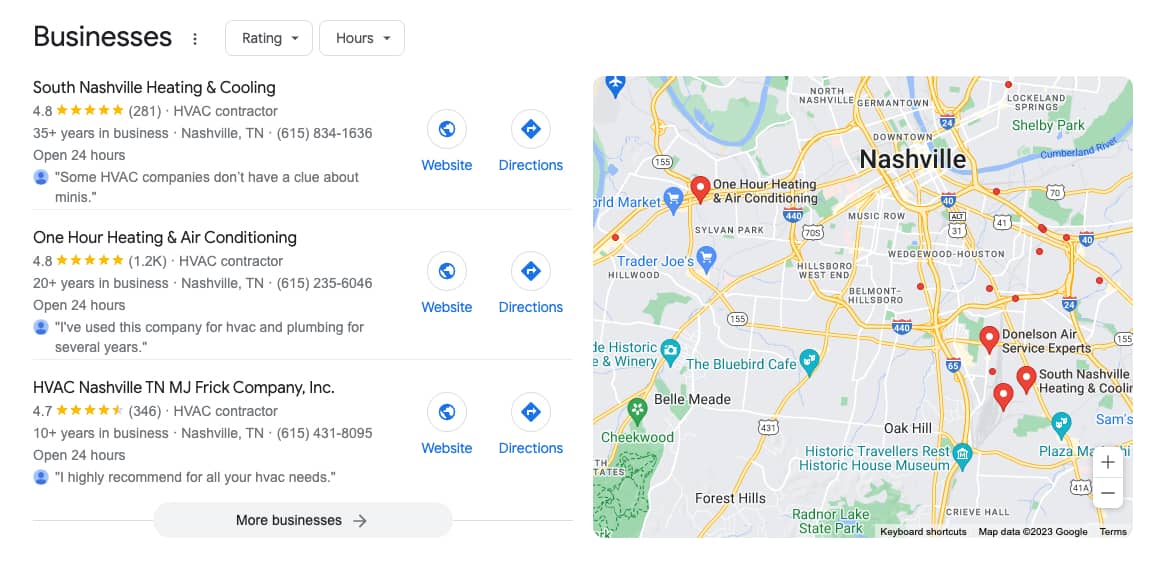
Screenshot by Kelly Moser
Let’s take a look at another form of a customer review. Customer reviews are the lifeblood of trust and reputation for service businesses.
Positive reviews aren't just testimonials—they're trust-builders. They affirm the quality of your service offerings and underscore the reliability of your team.
In other words, these reviews showcase the real-life success stories of customers who’ve benefited from your service. Genuine reviews are pivotal in helping potential customers make informed decisions.
Here’s a great example from Bridget Aiken, who shared her positive experience with Tim Leeper Roofing.
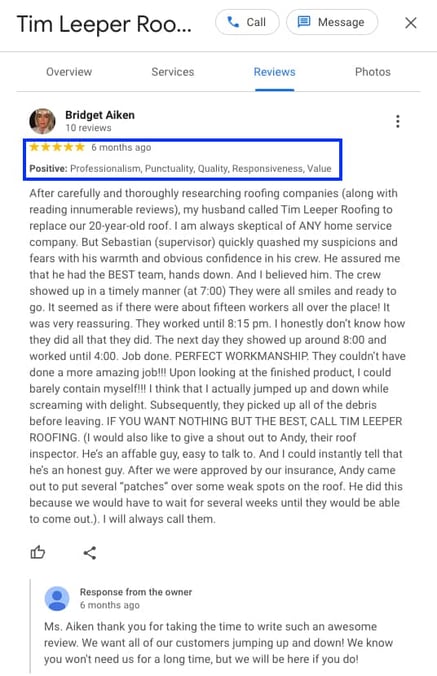 Screenshot by Kelly Moser
Screenshot by Kelly Moser
This particular review provides a sense of assurance, illustrating how Tim Leeper Roofing successfully earned the trust of an initially skeptical individual on their journey to replace an old roof.
The key takeaway? The more positive online reviews you collect, the more likely your target audience will choose your business over your competitors.
But when collecting online reviews, it’s important to be mindful when soliciting your customer base. With 71% of satisfied consumers being likely to leave a positive review if the company makes it easy for them to do so, you don't want to miss out on this strategy.
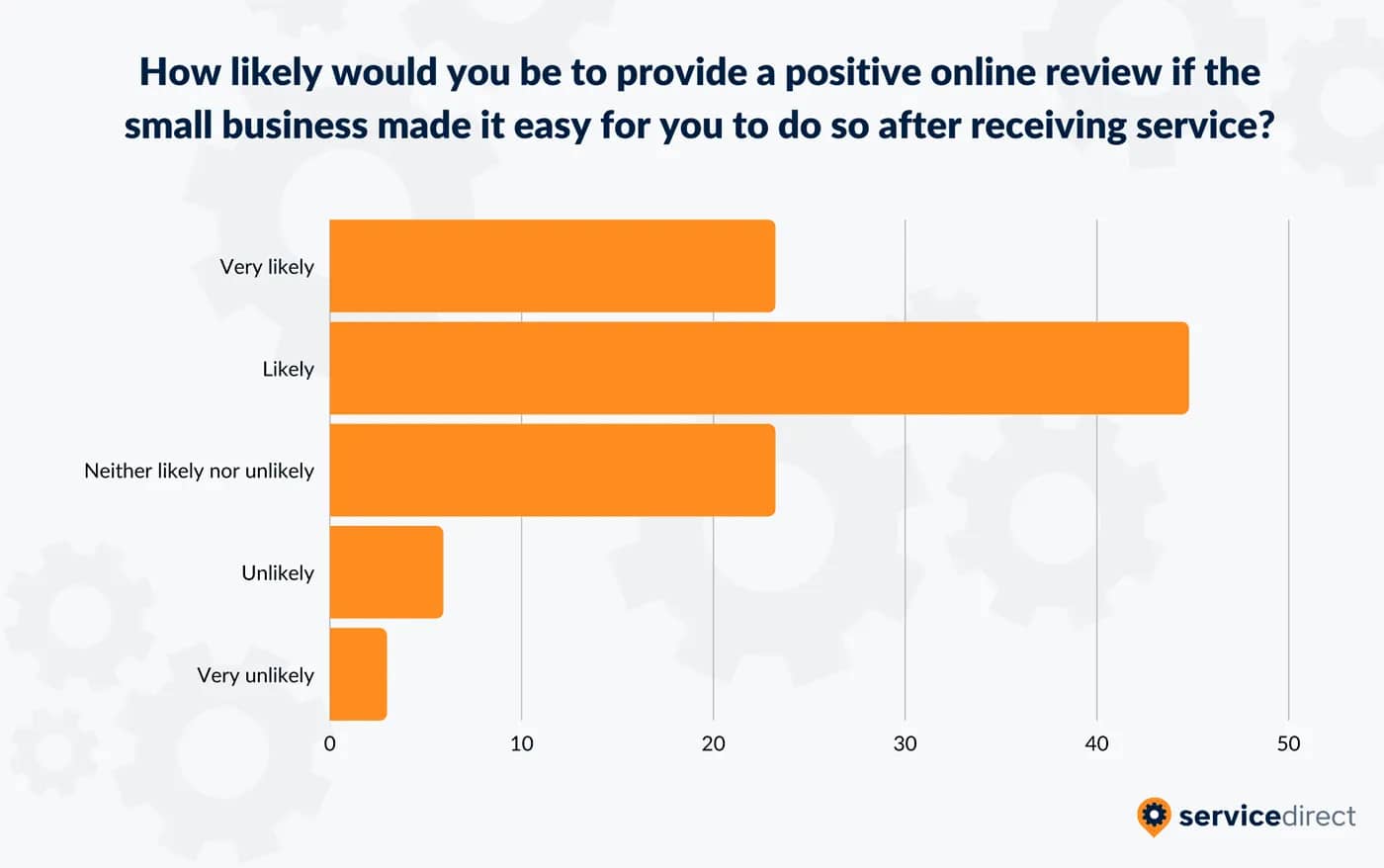
According to the Harvard Business Review, businesses who send solicitation emails for online reviews can help them score more reviews without skewing the results one way or the other:
“The results showed that sending an email had two effects. First, it increased the overall number of reviews by 8 percentage points in the first four days after travel. Second, it reduced the share of extreme (very positive or very negative) rating scores by 10%.”
The Influence of Customer Reviews
Customer reviews aren’t just important for building trust. They’re also essential for positioning your brand in a competitive industry.
If you’re facing off against tough competitors, you need more than just your word to convince prospects to do business with you. That’s where the power of social proof comes into play to show how much value you provide to your customers.
Customer reviews and client testimonials are the perfect examples of social proof to maximize transparency and honesty to show how you truly value your customers.
For example, if a pet owner is looking for a pet insurance plan, they might want to know how much pet insurance costs, what it covers, and what its benefits are.
That’s why a service business like Pumpkin uses customer reviews to showcase the value and quality of their plans, as well as the satisfaction and loyalty of their clients, "Pumpkin Parents."
Adding these customer testimonials and reviews from a third-party site to their service pages can help potential customers make informed decisions and feel more confident in their purchase decisions.
It also demonstrates that Pumpkin cares about its current customers and their pets and delivers on its promises.
At the end of the day, customer reviews can have a psychological effect on your potential customers. By showcasing how much value you can bring to their lives, they’re more likely to take your word and buy from you.
Building Trest Through Authenticity
If you’re running a service-based business, you should be mindful of one thing. You’re bound to receive both positive and negative reviews on platforms like Google, Yelp, and Facebook.
The goal here is to not take them personally. Customers have every right to express themselves in online reviews, even if their criticism can come across as hostile and rude. The way you respond will directly reflect on your brand’s authenticity.
Remember, other potential customers read online reviews regularly. If they see you undermining the experiences of former customers or fighting back with them, it could turn them off from giving you a call.
According to Google, responding with honesty and respect is key to dealing with negative reviews the right way:
“We all want 100% of our reviews to be positive, but even the best-run, most customer-focused businesses will receive bad reviews from time to time. When a negative review comes in, use it as a learning experience for how to improve your business in the future and how to showcase your responsiveness.
Respond calmly, honestly, and openly. The way you respond to a negative situation can reflect positively on your business, and a thoughtful post-review interaction can even encourage the customer to update their review.”
When responding to positive reviews, giving a simple “thank you” will often suffice. You can also use your response as an opportunity to showcase a new service offering or an upcoming sale.
For example, here's what that may look like:
“Thank you so much for your compliment. Make sure to schedule your yearly maintenance routine to improve the longevity of your car.”
You can level up your game by responding through a branded video, which allows you to speak directly to consumers. In addition to sharing news about your brand, you can remind them of your values while making the face of the brand known and allowing them to feel more comfortable with you.
To that same end, you can add something like:
“We’re here for you when you need us.”
On the other hand, if you receive a negative review, follow these tips:
-
Respond in a timely manner.
-
Don’t lash out. Always stay professional and respectful.
-
Investigate to see what went wrong before responding.
-
Apologize where appropriate, but avoid taking responsibility for things outside of your control.
-
Offer a chance to talk it over via email or phone.
-
Make sure you’re genuine.
In short, responding to positive and negative online reviews can build a sense of community where your customers don’t feel ignored or under-appreciated.
Leveraging Reputation for Growth
The power of word-of-mouth has always reigned as one of the most effective ways to land more customers and spread the word about your service offerings.
While a customer might tell a few friends about their experience with your business, now, a single review can reach thousands of potential customers in a matter of seconds.
These reviews are invaluable for service businesses where the product is intangible and largely based on customer experience. And that’s why leveraging the power of positive reviews is a legitimate growth strategy.
Positive reviews are valuable because they provide:
-
Social proof: When potential customers see others vouching for the quality of a service, it removes doubts and hesitations.
-
Higher visibility: Many online platforms prioritize businesses with better reviews in search results. So, positive reviews can directly impact your business's visibility and the likelihood of attracting organic traffic.
- Enhanced brand image: Positive reviews not only speak about the service quality but also about the values and mission of your company.
In software decision-making, G2 stands out as a beacon of trust. As the largest peer-to-peer review site for SaaS businesses, G2 boasts more than 80 million users annually, including employees at Fortune 500 companies.
But what makes G2 exceptional is its multifaceted approach to evaluating software solutions. It provides various features and options, facilitating in-depth product comparisons and real-time user feedback.
Let's consider CalAmp, a trailblazing company championing fleet management with complete telematics solutions, including the highly regarded 'CDL pre-trip inspection checklist.'
CalAmp's commitment to excellence is exemplified by its use of G2's 'incentivize reviews' feature. Extending invitations to their existing customers encourages genuine, firsthand feedback.
These reviews are tagged as 'invited on behalf of the seller' by G2, ensuring transparency and bolstering the credibility of each review.
In industries where trust is paramount, these transparent, customer-driven reviews play a pivotal role in establishing credibility and enhancing the reputation of service providers.
Let’s look at another brand that’s found great success using customer reviews as a growth strategy.
Bellhop has turned customer reviews into a key strategy to spearhead their growth over the past three years.
Thanks to these positive customer reviews on third-party sites like Trustpilot, Bellhop has earned a spot on the US Fastest Growing Private Companies list.
And the best part? They didn’t have to do all the heavy lifting (no pun intended). Simply by providing a high-quality service, they “wowed” their customers, who were, in turn, easily willing to share positive feedback.
Overcoming Challenges and Addressing Negative Feedback
While positive reviews can significantly boost your business's reputation and growth, negative feedback, if not handled appropriately, can tarnish the image you've worked hard to build.
The worst thing you can do when managing your reputation is to take negative feedback personally. That’s because reputation management is about showcasing your authentic business to the public.
Arguing with customers online gives off the notion that you think your business is perfect and not deserving of criticism. The fact is, every business will receive negative feedback from time to time.
You can’t please everyone. Even the most successful companies face their fair share of negative reviews. The difference lies in how they handle this criticism.
Keep these tips in mind when responding to negative criticism:
-
Engage in active listening to understand the root of the complaint.
-
Immediately acknowledging the issue paired with a genuine apology can go a long way in handling an upset customer.
-
Responding quickly to negative feedback limits potential damage and shows your commitment to customer satisfaction.
Don’t forget that negative criticism isn’t the end of the world. Think of negative feedback as a goldmine of information on things that need attention or improvement.
That way, you can fix these problem areas and take your services to the next level. Plus, it shows customers that you are committed to addressing their feedback and that it matters.
Amplifying Trust Across Platforms
Setting up a successful reputation management strategy means interacting with customers on as many online review platforms as possible.
Why? We live in a connected world where trust isn't limited to a single platform or point of interaction. And it’s up to you to radiate reliability across these various channels.
Google, Yelp, and Facebook are 3 of the most popular online review websites. However, there are more third-party platforms you can take advantage of to keep cross-channel consistency when responding to or collecting incoming reviews.
The last thing you want is a 5-star review on one platform with a slew of negative comments on another. This contradiction is confusing and reduces overall trust in your brand.
How do you prevent this dreaded fate? Encourage satisfied customers to share their experiences across platforms, expanding the reach of their testimonials.
One Hour Heating & Air Conditioning does an excellent job of maintaining trust across platforms. They have a 4.8-star rating on their Google Business page with over 1,200 reviews.
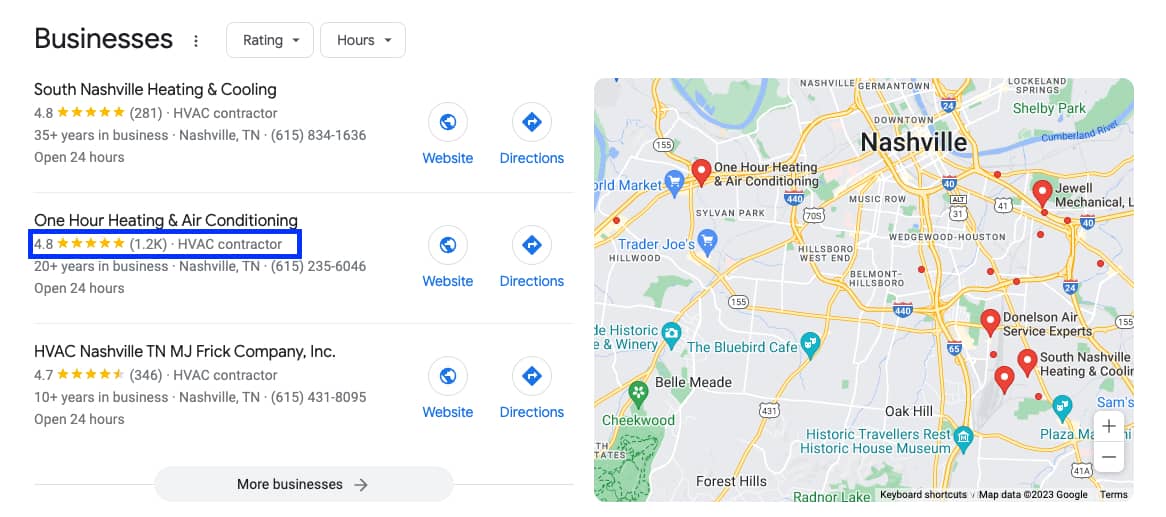
Screenshot by Kelly Moser
And on their Facebook page, they also have a 4.8-star rating with over 200 reviews.
The consistency across platforms shows potential customers that these reviews are genuine, boosting trust in this HVAC service.
Future Trends: Evolving Landscape of Customer Reviews
As we venture deeper into the digital age, the integration of artificial intelligence (AI) and machine learning (ML) is revolutionizing the way third-party platforms handle customer reviews.
These cutting-edge technologies aren't just enhancing automation but also protecting the integrity and authenticity of user feedback.
For example, more third-party platforms are beginning to weed out fake reviews to give businesses a fighting chance to manage an authentic reputation.
This initiative not only safeguards the credibility of these platforms but also guarantees that businesses are evaluated on genuine customer experiences.
By filtering out the noise of fabricated feedback, these platforms empower companies to cultivate and maintain a reputation rooted in authenticity and trustworthiness.
As we move forward, the interplay between automation and customer reviews will set new benchmarks for transparency and credibility in the digital world.
Final Words
Customer reviews can make or break your service business. Positive reviews can attract new customers, increase sales volume, and overcome your competition. Meanwhile, negative reviews help you identify areas for improvement to continue to deliver top-notch services.
So, are you ready to improve your reputation? Following the helpful information we’ve shared in this guide is a great start.
And if you need additional help along the way, Service Direct is here to help. We take the risk and complexity out of marketing your business.
Here’s to your online success!

Kelly Moser is the co-founder and editor at Home & Jet, a digital magazine for the modern era. She's also the content manager at Login Lockdown, covering the latest trends in tech, business and security. Kelly is an expert in freelance writing and content marketing for SaaS, Fintech, and ecommerce startups.

